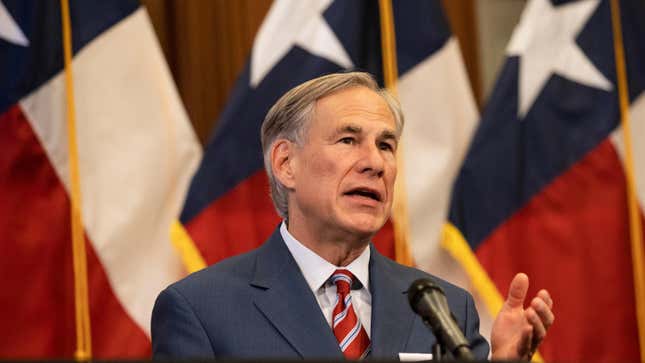
Republicans in the Texas House advanced restrictive voting legislation that would impact primarily Democratic voters, particularly those with disabilities and voters of color.
The Thursday night 79-37 vote on Senate Bill 1 moves Texas closer to enacting new voting restrictions, which include limits on early voting, drive-thru voting and anything that makes casting a ballot easier, according to the Texas Tribune. Republicans tried to sell the bill as a way to secure elections from voter fraud, but they did not present evidence that fraud was taking place.
The debate over the bill lasted 12 hours on the House floor. The House will vote on the final bill Friday. After the Senate and House work out some differences, the bill will head to Gov. Greg Abbott’s desk.
The bill will hurt marginalized voters across the state, but Republicans seemed to primarily be targeting Harris County, the state’s most populous county, where officials instituted a series of voting initiatives designed to increase access to voting. This included creating overnight early voting to accommodate folks who could not vote during regular hours, and drive-thru voting that was used by 1 in 10 of folks who voted early in person in 2020.
“The point that I make to you today is that Texas has consistently reviewed its election law policy over time, making changes and updates as needed,” state Rep. Andrew Murr, the Junction Republican who authored the legislation, said at the start of the House’s debate. “SB 1 continues this process.”
Again, the state’s GOP provided no evidence of fraud.
Texas Republicans in the House and Senate had disagreed on the details of their voter suppression, but became more aligned with their efforts Thursday. To make the GOP’s efforts even more despicable, they wanted to fend off any accusations of the bill being discriminatory by asking lawmakers not to use the word “racism.”
Here is more from the Tribune:
Democrats had pulled every trick out of the bag to delay the inevitable, including fleeing the state to delay the vote. But with Texas Gov. Greg Abbott calling special sessions until the Democrats returned, Democrats were going to eventually have to face a losing vote.
Seeking to head off heated discussions about discrimination, House Speaker Dade Phelan made an out-of-the-ordinary request to lawmakers at the start of their debate, urging them to avoid using the word “racism.”
His directive instead set up a tense exchange when Democrats speaking against the legislation invoked the Legislature’s recent history of intentionally discriminating against voters of color.
“I am convinced that because our elections were safe, secure and successful that we are not here really to deal with what I termed the pretext of the policy goals — incidents of fraud or likelihood of fraud,” said state Rep. Rafael Anchía, D-Dallas.
Anchía listed off past federal court rulings that found lawmakers engaged in intentional discrimination when they drew up a strict voter ID law that disproportionately burdened Hispanic and Black voters, and devised political maps the courts found illegally undermined the strength of their votes. That, Anchía argued, was the “backdrop” against which Republicans were pushing for this legislation.
“I know people bristle at certain terms that are used so I’ll just say [the Legislature has] been intentionally discriminatory,” Anchía said.
Shortly after, state Rep. Gina Hinojosa, D-Austin, approached the chamber’s back microphone to pose a question to Anchía: “Intentional discrimination against people of a certain race — is that racism?”
Her query prompted gasps and groans among other members and an admonition from Phelan who interrupted the exchange.
“We can talk about racial impacts of this legislation without accusing members of this body of being racist,” Phelan said.
“Respectfully, I’m not accusing members of this body,” Hinojosa replied.
Democrats are outnumbered in both chambers of the state legislature, so there is not much they can do. Democrats did try and seek assurances from Murr that some provisions would not return “if the current bill was also finalized out of the public eye.” Those restrictions in question include Sunday early voting hours that were criticized for targeting the “souls to the polls” efforts that favor Black churchgoers and a provision that would’ve made it easier for judges to overturn elections.
“I have no desire for those provisions to be contained in this document,” Murr said. “You asked how can we have assurance they won’t show up later and I say one really strong way to do that is for us not to have a conference committee and we pass quality legislation off the House floor.”

